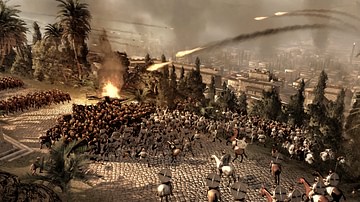Search
Did you mean: Romani?
Search Results

Article
Roman Armor & Weapons
From the days of the hoplites through the creation of the legionary until the fall of the Roman Empire in the west, the Roman army remained a feared opponent, and the Roman legionary's weapons and armor, albeit with minor modifications, remained...

Article
Roman Walls
The many Roman walls still visible today throughout Europe and the Mediterranean, be they defensive walls such as the Servian Wall or house and monument walls, tell us a great deal about the evolution of Roman construction techniques. Roman...

Article
Roman Artillery
Roman artillery weapons were instrumental in the successes of the Roman army over centuries and were especially used in siege warfare, both for offence and defence. Principally used in fixed positions or onboard ships, these machines, known...

Article
Roman Girls and Marriage in Ancient Rome
In ancient Rome, the legally acceptable age for marriage for girls was twelve. Although in middle-class Roman society, the most common age of first marriage for a girl was mid-to-late teens, evidence also shows that in a section of elite...

Lesson Pack
Roman Warfare & Battles
We have prepared five lesson plans including classroom activities, assignments, homework, and keys as well as: - Multiple choice quiz questions in an excel format - Glossary of keywords and concepts in an excel format - Open questions...

Article
Roman Games, Chariot Races & Spectacle
If there was one thing the Roman people loved it was spectacle and the opportunity of escapism offered by weird and wonderful public shows which assaulted the senses and ratcheted up the emotions. Roman rulers knew this well and so to increase...

Article
Roman Daily Life
From the early days of the Roman Republic through the volatile reigns of such ignoble emperors as Caligula, Nero, and Commodus, the Roman Empire continued to expand, stretching its borders to encompass the entire Mediterranean Sea as well...

Article
Roman Expeditions in Sub-Saharan Africa
Sub-Saharan Africa was explored by Roman expeditions between 19 BCE - 90 CE, most likely in an effort to locate the sources of valuable trade goods and establish routes to bring them to the seaports on the coast of North Africa, thereby minimizing...

Article
Roman Women in Business
Roman women faced legal, ideological, and cultural limitations in several areas of their lives; deep-rooted traditions regarding the role of women in the Roman world resulted in pre-conceived views which saw women characterised by weakness...

Article
Roman Roads
The Romans built roads over ancient routes and created a huge number of new ones. Engineers were audacious in their plans to join one point to another in as direct a line as possible whatever the difficulties in geography and costs. Consequently...